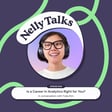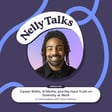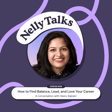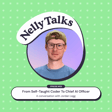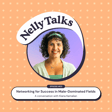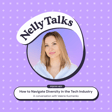
#04 | Finding Growth and Balance in Tech Careers - Natalie Godec
In this episode of Nelly Talks, Nelya sits down with the brilliant Natalie Godec, a cloud architect whose path from network engineering to cloud innovation is anything but ordinary. Whether you’re looking to break into DevOps, tackle the challenges of a male-dominated industry, or balance a tech career with your personal passions (cats included!), Natalie shares plenty of inspiring insights and practical advice that you won’t want to miss.
Timestamps:
00:00 Nelly Talks Intro
01:08 Meet Natalie Godec
02:23 CAT!!!
03:07 How did you get into Cloud Architecture?
12:52 What joys and challenges do you face in your role?
17:39 Do you feel that your role allows you to have a good work-life balance?
21:13 Have you ever considered a changing or pivoting your career?
25:19 How has AI impacted your role?
28:12 Do you feel like there has been improvement to diversity in tech?
32:22 What advice would you give someone starting out in tech?
34:03 Nelly Talks Outro
Key Points:
Choose a career path that you truly enjoy, as this will help you excel and stay motivated long-term. Natalie emphasises that working on something you love makes you more successful.
Tech evolves rapidly, and remaining open to learning is essential for career growth. Natalie emphasises curiosity as a key driver for staying relevant in the industry.
Seek out mentors, participate in discussions with colleagues, and offer your expertise when possible to grow professionally and contribute to your team’s success.
Be willing to change course if a particular area in tech doesn’t resonate with you. Focus on discovering the roles that match your skills and interests.
Set boundaries at work, use your vacation days, and prioritise personal time to avoid burnout.
Let us know what guests you'd like us to interview in future episodes!
